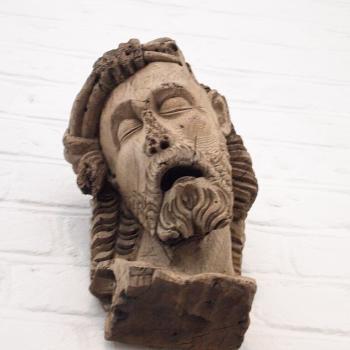![]() On Mount Tabor, Peter, James and John saw Jesus transformed in glory. “And after six days Jesus took with him Peter and James and John his brother, and led them up a high mountain apart. And he was transfigured before them, and his face shone like the sun, and his garments became white as light” (Matt. 17: 1-2 RSV).
On Mount Tabor, Peter, James and John saw Jesus transformed in glory. “And after six days Jesus took with him Peter and James and John his brother, and led them up a high mountain apart. And he was transfigured before them, and his face shone like the sun, and his garments became white as light” (Matt. 17: 1-2 RSV).
For Peter, this was a fundamental event in his life; he passed down his experience so that it would later be remembered by the Christian faithful. In this fashion, Jesus was proclaimed to be Son of God who had come in glory:
For we did not follow cleverly devised myths when we made known to you the power and coming of our Lord Jesus Christ, but we were eyewitnesses of his majesty. For when he received honor and glory from God the Father and the voice was borne to him by the Majestic Glory, “This is my beloved Son, with whom I am well pleased,” we heard this voice borne from heaven, for we were with him on the holy mountain (2 Ptr. 1:16-18 RSV).
Jesus was not some mythic figure who had been transformed into a demi-god after his death; the transfiguration demonstrated that in Jesus, the eschaton had become immanent. Jesus, truly man, was also God, and though the glory of God often remained hidden within him, it was his and was able to be shared by him with others. As man, he would humble himself, and would be lifted up in glory, a glory which could be and would be shared with others.
There were many purposes to the event. Following St. Leo the Great, the immediate purpose was to strengthen the faith of Peter, James and John, to give them an experience they could remember when they faced the difficult trials of Jesus’s passion:
In order, therefore, that the Apostles might entertain this happy, constant courage with their whole heart, and have no tremblings about the harshness of taking up the cross, and that they might not be ashamed of the punishment of Christ, nor think what He endured disgraceful for themselves (for the bitterness of suffering was to be displayed without despite to His glorious power), Jesus took Peter and James and his brother John, and ascending a very high mountain with them apart, showed them the brightness of His glory; because, although they had recognised the majesty of God in Him, yet the power of His body, wherein His Deity was contained, they did not know.[1]
Nonetheless, the experience presented itself in a way which transcended the immediate situation. Jesus demonstrated in it how he could and would teach people with an enlightening grace, a grace which sanctified and transformed all that it touched, so that even his clothes shown with a brilliant light. The apostles were drawn in by the radiance of the light so that through it, they were able to see the kingdom of God. The eschaton was manifest before them; the eschaton had become immanent and the kingdom of God was at hand. The world and all that is in it was being transformed, as Sergius Bulgakov explained:
First of all, insofar as the Transfiguration, as the manifestation of the Lord in glory, is already the anticipation of His eternal and eschatological glorification (the glorification of the Lord “coming in His Kingdom” and in this sense of the kingdom “come with power”) for “some,” that is, for the three apostles on earth, the Gory of the Lord already shines forth in the Transfiguration. It shines forth not only in Christ, transfigured in the image of His coming Glory, but also in this world, transfigured together with Him in certain of its parts: in Christ’s garments and, of course, in the surrounding air, mountain, and land.[2]
The kingdom of God had come; the eschatological glory of God was revealed in and through Jesus Christ. The light which shines in the darkness is the light of grace which teaches and enlightens those who experience it in their lives. It is the light of God, the light which shines throughout the kingdom of God. It is, therefore, the deifying grace of God which unites those who partake of it with God. By seeing it on Mount Tabor, the three apostles saw the kingdom of God, fulfilling Jesus’ promise that some which he taught would live to see it, as St. Gregory Palamas understood:
None the less, in accordance with the Saviour’s promise they did see the kingdom of God, that divine and inexpressible light. St Gregory of Nazianzos and St Basil call this light ‘divinity’, saying that ‘the light is the divinity manifested to the disciples on the Mount’, and that it is ‘the beauty of Him who is almighty, and His noetic and contemplatable divinity’. St. Basil the Great also says that this light is the beauty of God contemplated by the saints alone in the power of the divine Spirit; and again he writes, ‘On the mountain Peter and the sons of thunder saw His beauty shining more brightly than the sun; and they were privileged to receive with their eyes a foretaste of his advent’. [3]
The light which shined transcended mere earthly light. It was a manifestation of the grace of God. That grace is given to us by God. It unites us with him so that we join ourselves with him in his uncreated divine energy, taking in what we can and making us one with it. Just as a bright light can overwhelm us, so the greatness of God transcends us, but by seeing and coming to know the glory of God through that light, we can be taught by God and realize that what we receive is a mere shadow of the full glory of God:
They were taught, in a hidden way, that the wholly blessed radiance that shone with dazzling rays of light from the Lord’s face, completely overwhelming the power of their eyes, was a symbol of His divinity, which transcends intellect, being and knowledge.[4]
The glory of God revealed at Mount Tabor overwhelmed the apostles who had been called to witness it. Just as we cannot stare into the sun for long before its brightness overcomes our eyes, so looking at the glory of God will overcome us and our spiritual sight, blinding us from its brightness. The brightness of the light was not beyond what God could produce, but rather, was manifested in a way which the apostles could see it, know of it, before being overwhelmed by it so that they could then come to know and realize the greater glory which lies beyond all of us as it exists in God. They found themselves experiencing the kingdom of God, transformed in that experience, but they could not stay there; the revelation was in anticipation of the work which was yet to be done; for this reason, they found the experience had to come to an end:
And behold, there appeared to them Moses and Elijah, talking with him. And Peter said to Jesus, “Lord, it is well that we are here; if you wish, I will make three booths here, one for you and one for Moses and one for Elijah.” He was still speaking, when lo, a bright cloud overshadowed them, and a voice from the cloud said, “This is my beloved Son, with whom I am well pleased; listen to him.” When the disciples heard this, they fell on their faces, and were filled with awe. But Jesus came and touched them, saying, “Rise, and have no fear.” And when they lifted up their eyes, they saw no one but Jesus only. (Matt. 17:3-8 RSV).
The eschaton had become immanent; the apostles saw the truth of this, and yet, Jesus still had a mission to accomplish. Likewise, the apostles had their own mission to undertake. The glory of the kingdom is wonderful to experience, but it does not call us to a mere inactive silence; rather, it teaches us as it unites with us, so that we can go out and spread the good news of the kingdom of God. We are called to share, like Peter, the experience we have of God’s glory; the grace contained in it is to radiate in us and through us, but this cannot be done if we selfishly try to set up a booth for us to stay in once we experience the glory of God. We must partake of the grace, the uncreated wonderful grace of God, so that we not only find ourselves in the kingdom of God, but also that we can bring others with us, sharing that grace with them so that they too can be lifted up and experience the radiant truth of God’s kingdom. Those who follow after Jesus will be like him; they will meditate and pray but then they will go out into the world seeking to bring good news to the poor and needy so that God’s will be done on earth as it is in heaven.
[IMG=Iconography Metamorphosis Transfiguration Church [Creative Commons CC0] via maxpixel.net]
[1] St. Leo the Great, “Sermon 51,” in NPNF2(12): 163.
[2] Sergius Bulgakov, The Lamb of God. Trans. Boris Jakim (Grand Rapids, MI: William B Eerdmans Publishing Company, 2008), 339.
[3] St. Gregory Palamas, “Topics on Natural and Theological Chapters and on the Moral and Ascetic Life: One Hundred and Fifty Text,” in The Philokalia: The Complete Text. Volume IV. Trans. G.E.H. Palmer, Philip Sherrard, Kallistos Ware, et. al. (London: Faber and Faber, 1995), 414-5.
[4] St. Maximos the Confessor, On The Difficulties In the Church Fathers. The Ambigua. Volume I. trans. Nicholas Constas (Cambridge: Harvard University Press, 2014),191 [Amb. 10.17]
Stay in touch! Like A Little Bit of Nothing on Facebook













